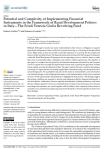Cisilino F., Licciardo F. (2022). Potential and complexity of implementing financial instruments in the framework of rural development policies in Italy-The Friuli Venezia Giulia revolving fund. Sustainability, 01/12/2022, vol. 14, n. 23, p. 1-21.
https://doi.org/10.3390/su142316090
https://doi.org/10.3390/su142316090
| Titre : | Potential and complexity of implementing financial instruments in the framework of rural development policies in Italy-The Friuli Venezia Giulia revolving fund (2022) |
| Auteurs : | F. Cisilino ; F. Licciardo |
| Type de document : | Article |
| Dans : | Sustainability (vol. 14, n. 23, December 2022) |
| Article en page(s) : | p. 1-21 |
| Langues : | Anglais |
| Langues du résumé : | Anglais |
| Catégories : |
Catégories principales 06 - AGRICULTURE. FORÊTS. PÊCHES ; 6.1 - Généralités. Situation AgricoleThésaurus IAMM AGRICULTURE ; FINANCEMENT ; CREDIT ; POLITIQUE DU CREDIT ; BANQUE ; POLITIQUE DE DEVELOPPEMENT ; DEVELOPPEMENT RURAL ; UNION EUROPEENNE ; ITALIE |
| Résumé : | Although in recent years some credit institutions have shown a willingness to support agricultural entrepreneurs, there is still a lack of private financing or co-financing in the agricultural sector. Many farms, in fact, are not able to meet the indicators or to provide the fees required by banks to obtain investment loans. The financial instruments introduced by the European Commission within the Rural Development Programme aim at supporting access to credit for farms to make them more economically viable, competitive, and suited to market requirements. The objective of this paper is to analyze the role played by the financial instruments introduced by the European Union to support and encourage the improvement of farms and, in general, the agriculture, forestry, human capital, and rural development in Italy. The paper explores the topic in detail by presenting a case study of a region that has successfully applied these instruments using a revolving fund with a special background. The quantitative data used in this study are administrative; some information was obtained through a survey. Regional information on the implementation of this fund is examined in terms of both opportunities and limitations to highlight the best practice. The findings suggest that certain conditions are required to develop and implement effective financial instruments: a real and effective collaboration between regional administration, banking institutions, and farms that are willing to grasp the newness; a reasonable period of time (some years); know-how because knowledge and experience are crucial, together with the ability to face complexity both in terms of normative issues and financial engineering instruments themselves. Several implications derive from these findings. |
| Cote : | En ligne |
| URL / DOI : | https://doi.org/10.3390/su142316090 |







